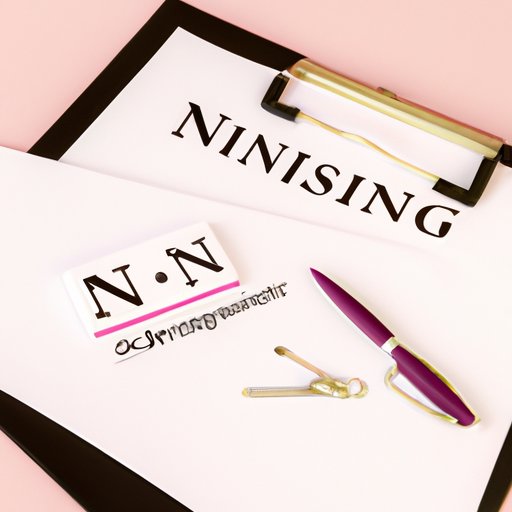Introduction
Nursing is a rewarding profession that allows individuals to make a difference in people’s lives every day. As a registered nurse (RN), you will have the opportunity to work in various healthcare settings and specialties, providing patient care, collaborating with medical teams, and improving patient outcomes. If you’re considering becoming an RN, this step-by-step guide is here to help and support you on your journey.
Step-by-Step Guide
To become an RN, the following steps are required:
Prerequisites to Becoming an RN: To qualify for RN licensure, you need to have a diploma, an associate’s degree in nursing, or a bachelor’s degree in nursing.
Getting Licensed: Upon graduating from an approved nursing program, you need to pass the NCLEX-RN exam. Additionally, most states require specific courses in topics such as pharmacology and nursing ethics.
Tips for Succeeding: Make sure you study hard, take advantage of resources, like tutoring, and get as much clinical experience as possible.
Interviews with RNs
Hearing from experienced RNs is beneficial when pursuing a nursing career.
The Importance of Hearing from Experienced RNs: Experienced RNs went through the process of becoming licensed and can share their insights and invaluable advice for those starting their journey.
Interviews with RNs: Interviews with recently licensed RNs revealed that starting early with clinical experiences, nutrition and pharmacology preparations, an increased focus on study time, and taking care of one’s physical and mental health are all helpful to be successful in the process.
Final Thought: Listening to other experienced RNs’ tips can help you tailor your own approach to this career.
RN Education Options
Choosing to pursue an associate or bachelor’s degree in nursing has significant benefits and drawbacks for each.
Overview of the Different Education Options: There are two primary education paths to become an RN – an associate’s degree or a bachelor’s degree. Associate degree programs are usually two years, while bachelor’s degree programs take four years.
Comparison of Associate’s and Bachelor’s Degree Options: Associate’s degree programs typically cover the basics of nursing practice, whereas a bachelor’s degree program will cover management, communication, and leadership skills.
Advice for Choosing the Right Education Path: Both education paths can lead to RN licensure, but it is essential to consider your long-term career goals and determine which degree will best help you with them.
Frequently Asked Questions
There are common questions about becoming an RN.
Length of Time it Takes to Become Licensed: It can take around two to four years, depending on which degree level you pursue.
Salary Range: According to the Bureau of Labor Statistics, RNs earn a median annual salary of $75,330.
Job Growth Prospects: The demand for RNs continues to grow, with a projected 7% increase in demand by 2029.
Types of Skills Needed: RNs need a wide range of skills, including communication, critical thinking, leadership, and a deep knowledge of medical procedures.
Specialty Focus
Choosing a nursing specialty can provide you with experiences that match your passions. Collecting information about the specialty beforehand can guide decisions regarding education or your skill set.
Overview of the Different Specialties Within Nursing: Nursing has many specialties to choose from, including pediatric nursing, critical care nursing, and emergency nursing.
Detailed Information on One Specialty: Pediatric nursing is a popular specialty that deals with caring for children and young people aged from newborn to 18 years old. An RN needs to have a broad knowledge of growth, development, and pediatric pharmacology.
Necessary Skills, Education, and Job Prospects for that Specialty: Pediatric RNs must be adept at communicating with young patients and coherently relaying medical information to them. The median annual pay is around $63,000.
Advice for Succeeding in that Specialty: A general familiarity with childhood illnesses, willingness to apply patience, and desire to work with parents and families closely are key to being a successful pediatric nurse.
Conclusion
Pursuing a nursing career can be daunting, but don’t let that keep you from becoming an RN. With education, licensing, and the right career path, nursing can be a rewarding and fulfilling profession. Remember to use the information you learned here, seek advice from experienced RNs, pursue the right education level options, and choose a specialty that matches your passion, providing access to long-term opportunities that fit your career goals. Whatever your approach, becoming an RN can change your life and others’ lives by making a difference in people’s lives every day.
